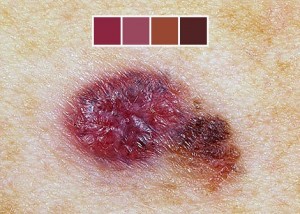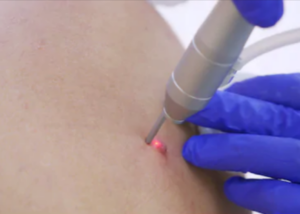
A person is diagnosed with metastatic melanoma but the original “bad mole” cannot be found; why IS this?
It’s crucial to find that primary melanoma tumor so that it can be surgically excised.
Melanoma cells have a unique appearance under a microscope, which is why a person can be diagnosed with melanoma that has metastasized (spread) without the original or primary lesion or “mole” being located.
What sometimes makes it impossible to find the primary melanoma?
“The primary melanotic tumor can be extra-cutaneous and occur in invisible sites like the brain, gut and eye,” says Sharyn Laughlin, MD, board certified dermatologist and co-founder of the DermaEnvy Skincare ™ line of sun protection products and medical director of Laserderm, a pioneering laser skin surgery clinic in Ottawa, Ontario, Canada.
In other words, unlike a malignant tumor that can be located via a visual sweep of the external skin, an extra-cutaneous (beyond the skin) growth that starts in, say, the brain or stomach can’t just be found with the naked eye.
“Another explanation is that the primary cutaneous [on/in the skin] melanoma was removed and not recognized as a melanoma,” continues Dr. Laughlin.
Now that is scary news, and unfortunately, it’s REAL news.
Dr. Laughlin explains, “There have been instances where patients had hair removal with a light based or laser device, and a dysplastic [atypical] mole or actual melanoma was ablated during the procedure by someone with an untrained eye.
“This is one reason why people with moles should not have laser assisted hair removal to the affected areas — or at the very least have the photoepilation done by a dermatologist who has assessed the moles or nevi, and knows for certain that they are benign.
“The number of laser devices doing photoepilation in non-medical or non-dermatology hands is a cause for some concern, although the missed melanoma is not likely to be very common in this situation.”
There are other reasons a “mole” (which is actually a melanoma) might end up getting removed by someone untrained to recognize a suspicious spot or someone who doesn’t even consider inspecting first for suspicious signs.
Home Mole Removal
Many people actually employ home mole removal techniques for cosmetic reasons.
What they’re removing may actually be melanoma, even though the “mole” looks normal, albeit cosmetically unappealing due to location or in the way of a bra strap.
It may be a new spot that looks like a regular mole (because the cancer is in a very early stage), or a pre-existing mole that still looks normal (for the same reason).
Even if the mole has always looked normal for years and has not shown any signs of changing, the person at home should NOT remove it.
What may look normal and unchanged to the naked eye could actually be an “always been there” mole that’s now in the very early transformation stages of melanoma.
What the layperson also doesn’t realize is that removing a mole at home doesn’t actually get rid of the entire thing – even though it may appear that way.
If a little is left behind – even if it’s not visible to the naked eye – this little bit – just a small batch of cells — could contain cancer cells that eventually spread!
Another reason a primary melanoma is never found in some patients is that the original spot was actually removed by a dermatologist for cosmetic purposes – but never sent to a dermapathalogist for microscopic analysis.
Every single mole that is ever removed by a doctor, regardless of reason, should be sent for a biopsy! EVEN if the dermatologist says the mole looks benign.
One last reason why in some cases a primary melanoma is never found:
The area where the original growth was located was injured in a car wreck, machinery accident, dog attack, knife attack, what-have-you, and the area with the growth was either sheared away at the time of the accident or removed surgically.
 In practice for 30+ years, Dr. Laughlin has been lead or co-investigator in many research trials and an innovator in developing new laser technology. dermaenvy.com.
In practice for 30+ years, Dr. Laughlin has been lead or co-investigator in many research trials and an innovator in developing new laser technology. dermaenvy.com.
 Lorra Garrick has been covering medical, fitness and cybersecurity topics for many years, having written thousands of articles for print magazines and websites, including as a ghostwriter. She’s also a former ACE-certified personal trainer.
Lorra Garrick has been covering medical, fitness and cybersecurity topics for many years, having written thousands of articles for print magazines and websites, including as a ghostwriter. She’s also a former ACE-certified personal trainer.
.








































